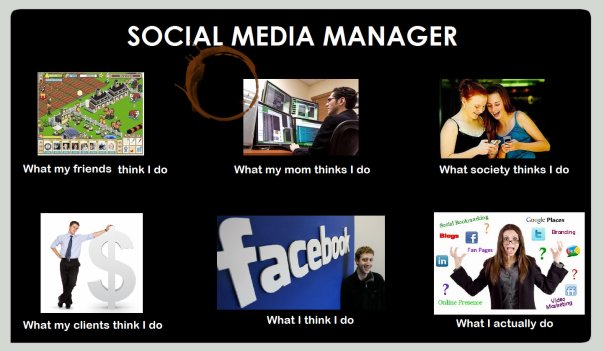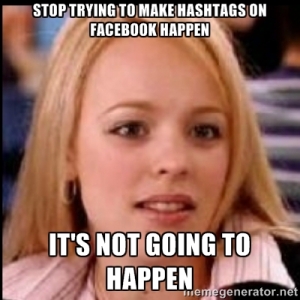Category Archives: Social Media
What IS a Community Manager, Anyway?
Posted by MaryMallard
A few weeks ago I was invited to talk on a panel for My Community Manager‘s #CMGRHangout. The topic was how community managers survive their day-to-day. It was a really interesting topic, and I learned some good stuff from my peers.
But, back up a sec – WTF is a community manager (hereon referred to as cmgr)? Well, that’s kind of a loaded question that has a lot of different answers, depending on who you talk to. Generally, when people ask what I do, I just say I work in “social media”, which conjures up its own ideas of what I do all day.
So I decided to put together a list of things that cmgrs are, because I think it’s important that people understand the scope of what social media entails. And also I like lists.
1. We are data nerds
When you’re working in social, you need to have a strategy. To formulate that strategy, you define goals. And how do you know if your strategy is working towards those goals? DATA. And lots of it.
I use a couple tools to track the performance of my social media efforts, and I track them weekly, monthly and quarterly in a spreadsheet. At the end of the month/quarter, I make a super kickass PowerPoint (star wipes FTW) to show my boss where we were, where we are, and where I think we should be going with our social strategy.
You need to be able to look at raw data, analyze it, and draw conclusions based on the trends you’re seeing as to how you should proceed. It’s pretty cool, actually. *pushes glasses up nose*
2. We are copywriters
Social media is about WRITING. Getting people to pay attention, click, engage – the number one way to do that is based on your wording. Just like a content marketer does their best to write eye-catching headlines, we work within character limits to get our story across as succinctly as possible, while still keeping it interesting.
And not all platforms are the same, either. What works on Twitter in 140 characters may not work on Facebook (a.k.a. PLEASE STOP USING HASHTAGS ON FACEBOOK).
Different audiences, different ways of delivering information – if you don’t have good writing skills, you’re dead in the water. Sorry kids.
3. We are content creators and curators
When you work in social, whether for a brand or yourself, there’s a level of etiquette around how much you self-promote. Think of it as a cocktail party: if you’re in a group constantly talking about what YOU did last weekend and how YOUR job is going and OH did I tell you about (insert latest accomplishment here), no one is going to want to stand around listening to that. They’ll probably stop inviting you places – and then you’ll be on your couch on a Friday night drinking red wine from a bottle, telling your dog how great you are. But I digress.
There’s what we call the 80/20 rule. 80% of the time you promote other people’s stuff, and 20% of the time you talk about yourself. I’m not going to get into the specific reasoning for that, however, it does equal quite a bit of work for a cmgr.
Generally, you have a content calendar of stuff you want to promote/share/talk about for the month (created content). I tend to work with our content specialist/blog writer and editor extraordinaire/my personal cheerleader, Emma, on this.
In addition, you have the task of finding other stuff from other sources (blog articles, videos, interesting tidbits) to share with your audience (curated content). It SOUNDS easy, but sometimes it can be really, really, REALLY hard. Especially when everyone is writing about the same damn thing over and over. Which happens pretty often.
4. We are designers
Ok, so not designers in the TRADITIONAL sense. And I don’t mean to take anything away from the super talented people I know who are designers. But, sometimes you need a graphic really quick, and you don’t want to bother your super talented but also SUPER BUSY designer. That’s when you take matters into your own hands.
Luckily, there are a lot of web apps that make designing halfway-decent looking stuff insanely easy (my fave is Canva), which lets me whip up Motivation Monday or Fun Fact Friday graphics in less time than it would take for me to run a mile.
….I’m a really slow runner.
5. We are researchers
You know how people are always complaining every time Facebook makes a small change to your newsfeed? WELCOME TO OUR LIVES, EVERY OTHER DAY.
There is so much stuff that happens behind the scenes of your favorite social networks, and a lot of the changes (mainly in Facebook’s case) work against brands and marketers trying to use them as advertising channels. What does this mean for a cmgr?
Reading. Lots and LOTS of reading. I scroll through social media blogs every day to make sure I keep up to date on any changes happening anywhere, learn new methods of circumventing those changes (or just ideas on how to do my job better), and just to stay current on other stuff happening in the social media world.
And finally…
We’re a pretty cool bunch. I mean, @JakeStateFarm is handled by at least one (probably more) of us. We’re creative, funny, and pretty fun to go get a beer with. So go ahead, applaud your local cmgr!
There’s probably a lot that I’m missing (it is a Sunday afternoon), but that’s what the comment section is for! What does the cmgr title mean to you?
Image credit: MISSEILAH 2.0
What to Do When Someone Says a Competitor Is Better Than You on Social Media
Posted by MaryMallard
Welcome to my first social media-related post! Since I work in social, I decided I should probably start writing some educational stuff. So sit back, relax, and enjoy!
A couple weeks ago I had a pretty interesting experience on Twitter with a brand I was considering doing business with, and it got me thinking – there’s a lot of tricky situations that happen in social every day, and there’s a lot of different ways to deal with them. I want to share MY methods of working through this particular situation, in hopes that it can be a help to others.
All Companies are Not Right for All People
When someone is comparing your product or service with someone else’s saying they’re better, your first reaction is probably to get defensive. After all, this is YOUR company they’re talking about. You’re the best for everyone, right?
WRONG.
Generally, all companies are not right for all people. Unless you’re a bacon factory. In which case, carry on. You’re fine. But in most cases, what is right for one customer may not serve another. That’s why we have competitors – they (usually) offer something you don’t, or claim to do whatever you do, better.
So what should you do when someone says, “I think that X company is the same if not better than Y,”? First, take a look at the actual conversation. If it’s on Twitter, look at the previous tweets. Is this in response to what someone else said? Usually tweets or comments like this are part of a larger conversation. The original tweet tends to be someone asking an opinion of their followers, or advice from other people who use yours or a similar product or service. Stepping back and taking a minute to survey the landscape can can help save you from a faux pas in your response.
What Might Happen if You Call Out a Competitor
When you see someone comparing you to another guy, your first thought may be, “They’re so wrong! They don’t understand my company! I need to change this!” That’s basically what happened in my exchange. They called out their competitor by name, and asked their community to try and change my opinion.
How did it turn out? It started a FIRESTORM. Customers of this brand were tweeting at me left and right, and some of them weren’t so nice. Not helpful, not constructive. Is that really how you want your business represented to potential customers? Didn’t think so.
The one positive point of the situation is that this company clearly has a really passionate community. Harnessing that passion can be a great tool, if you use it correctly. In this case, it wasn’t done so well.
So, How Could This Have Been Handled Differently?
In this particular scenario, I have a two-pronged approach.
1. Leave your competitor out of it. – I am VERY against calling out a competitor like that. It isn’t helpful, and it’s bad form. Like I said before, what you provide isn’t right for everyone. So don’t make yourself look bad by trying to put down other companies who are also in your industry.
2. Let your community help. – Any time someone is looking to do business with you, the best thing you can do is BE HELPFUL. Instead of trying to change someone’s opinion, direct them to your community in a way that encourages constructive conversation. After all, they’re the ones who are using your product or service!
For example, you can retweet someone and say “Can anyone help Joe?”, or “Anyone have experience with this?”. It will be far more well received by the potential customer, and your audience, and is more likely to lead to a sale.
The one thing I want to drive home here is that your first interaction with a potential customer is the most important one. How you treat their questions and comments really reflects back on you as a company, and can really influence their decision one way or another. Taking a few minutes to step back, take and breath, and create a thoughtful response can really make a huge difference.
What’s your strategy for dealing with this type of situation?
Posted in Social Media
Tags: brand, business, company, competitor, social-media, twitter


